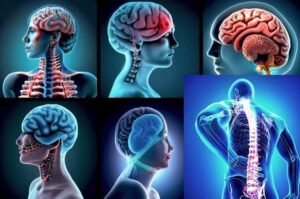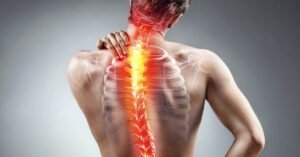Spinal Disc Problem Treatment in Delhi: Symptoms, Causes & Expert Care
A spinal disc, also known as an intervertebral disc, is a soft, gel-like cushion located between the bones (vertebrae) of the spine. These discs act as shock absorbers for the spine, allowing for flexible movement and helping to protect the vertebrae from damage. Each disc has a tough outer layer (annulus fibrosus) and a soft inner core (nucleus pulposus).
Reach Out for Expert Care
What Is a Slip Disc?
A slipped disc, also referred to as a herniated or bulging disc, occurs when the inner core of the disc pushes through a tear or weakness in the outer layer. This can press on nearby nerves, causing pain and discomfort. Slip disc treatment in Delhi, India, focuses on relieving this pressure and managing symptoms effectively.
What Are the Symptoms of a Slip Disc?
Symptoms of a slipped disc can vary depending on the location and severity of the herniation. Common symptoms include:
- Back Pain: Persistent or sudden pain in the lower back or neck.
- Radiating Pain: Pain that travels down the legs (sciatica) or arms, depending on which part of the spine is affected.
- Numbness and Tingling: Sensations of numbness, tingling, or weakness in the arms or legs.
- Muscle Weakness: Difficulty in moving or weakness in the muscles controlled by the affected nerves.
Recognizing these symptoms early is essential for effective management and treatment.
What Causes a Slip Disc?
Several factors can contribute to a slip disc, including:
- Ageing: As we age, spinal discs naturally lose hydration and flexibility, making them more prone to injury.
- Injury: Sudden trauma or injury to the spine, such as from a fall or heavy lifting, can cause a disc to herniate.
- Repetitive Strain: Repeated stress or poor posture over time can weaken the disc and lead to a herniation.
- Genetics: Some people may have a genetic predisposition to disc problems.
Understanding the causes can help prevent and manage this condition.
How Is a Slip Disc Diagnosed?
Diagnosing a slipped disc typically involves:
- Medical History and Physical Examination: Discuss your symptoms and perform a physical exam to assess pain, movement, and neurological function.
- Imaging Tests: Techniques like Magnetic Resonance Imaging (MRI) or Computed Tomography (CT) scans provide detailed images of the spine, helping to identify the location and extent of the herniation.
- Nerve Tests: Electromyography (EMG) and nerve conduction studies can assess how well nerves are functioning.
Consulting the best doctors for slip disc treatment ensures a thorough diagnosis and personalized treatment plan.
What Are the Treatment Options for a Slip Disc?
Treatment for a slipped disc aims to relieve pain, improve function, and prevent further damage. Common options include:
- Medications: Pain relievers and anti-inflammatory drugs help manage pain and reduce inflammation. Muscle relaxants may also be used for associated muscle spasms.
- Physical Therapy: Targeted exercises and therapies to strengthen the back muscles, improve flexibility, and alleviate pain.
- Lifestyle Modifications: Adjusting daily activities and improving posture can reduce strain on the spine and prevent future issues.
- Surgical Options: In severe cases where conservative treatments are ineffective, surgical procedures such as discectomy (removal of the herniated part of the disc) or spinal fusion may be considered.
Why Choose Us for Your Spinal Disc Treatment?
When it comes to slip disc treatment in Delhi, India, our team is recognized as the best doctors. We specialize in diagnosing and treating spinal disc issues with a focus on effective, personalized care. Our experts are skilled in managing symptoms and addressing the underlying causes of slip discs, ensuring comprehensive treatment and recovery. Trust us to provide the highest quality of care tailored to your specific needs, using the latest advancements in spinal health.

Dr. Vikas Gupta’s Medical Content Team
Dr. Vikas Gupta’s medical content team specialises in creating accurate, clear, and patient-focused healthcare content. With strong clinical understanding and expertise in technical writing and SEO, the team translates complex medical information into reliable, accessible resources that support informed decisions and uphold Dr. Gupta’s commitment to quality care.
This content is reviewed by Dr. Vikas Gupta
Related Blogs



